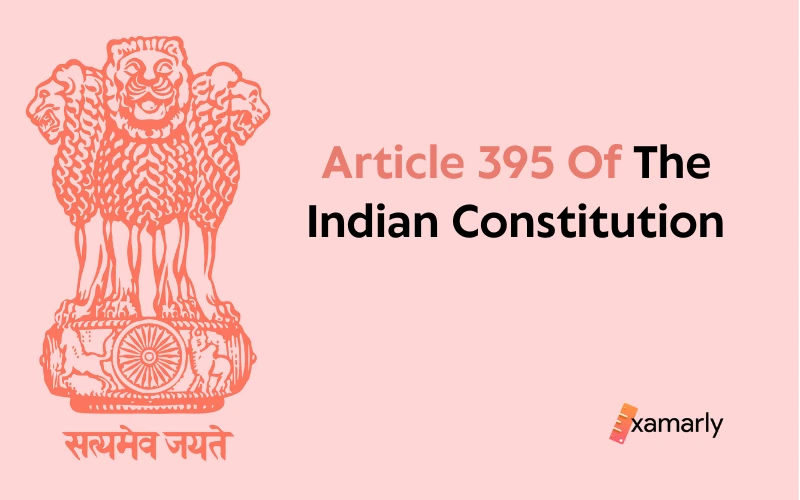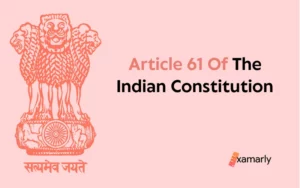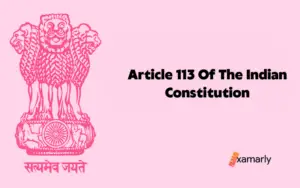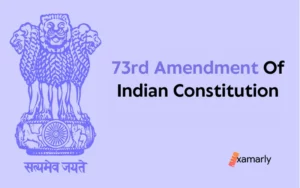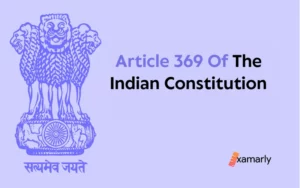Article 395 of the Indian Constitution speaks about the repeal of some acts. Article 395 is contained in Part XXII of the Constitution which is titled Short Title, Commencement, Authoritative Text In Hindi And Repeals.
This page provides you valuable insight into Article 395 and helps you to figure out which Acts were repealed under Article 395.
What Is Article 395 of the Indian Constitution
Article 395 discusses the repeal of certain acts. Its provisions are as follows:
The Indian Independence Act of 1947 and the Government of India Act of 1935, along with all enactments amending or supplementing the latter Act, are thus repealed; the only exception to this is the Abolition of Privy Council Jurisdiction Act of 1949.
Government of India Act of 1935
This act abolished the dyarchy imposed by the Government of India Act, 1919, and it established the Federation of India, which would be composed of the provinces of British India plus all or a portion of the Princely state.
Indian Independence Act of 1947
India and Pakistan were established as two new separate dominions as a result of their implementation of the partition of British India. On 18 July 1947, the Act was given royal approval, and on 15 August, the modern-day nations of Pakistan and India were established.
Abolition Of Privy Council Jurisdiction Act of 1949
With the passage of this Act, the Federal Court’s appellate jurisdiction was expanded, and the previous system of direct appeals from the High Court to the Privy Council with or without Special Leave was eliminated.
The Indian government passed the Abolition of Privy Council Jurisdiction Act in 1949.
Significance Of Article 395
It is of the utmost importance to India’s constitutional framework since, without it, it would be impossible to assert that India is truly independent.
As a result of the fact that Article 395 of the Indian Constitution was drafted after all of the preceding articles, it is possible to trace the origins of those preceding articles back to the Indian Independence Act 1947 and the Government of India Act 1935.
All of the articles of the Constitution that can trace their roots back to the Indian Independence Act 1947 or the Government of India Act 1935 have been rendered null and void as a result of the passage of article 195, which repeals both of those pieces of acts.
This has the practical effect of indicating that the authority once held by the British government has been replaced by the constitution. This is a necessary step in the transition from being a colony under British administration to a sovereign independent nation.
By doing this, it also nullified any laws that added to or amended the GoIA. However, rather than complementing (adding to) that legislation, the constitution itself supplants (replaces) it. Consequently, it does not eliminate itself.
In A Nutshell
Article 395 is an important provision that sets out the legal framework for the repeal of certain acts that were in force in India prior to the adoption of the Constitution. Its constitutional provision helps to ensure the smooth transition from the colonial legal system to the independent legal system of the Republic of India.
In the interest of additional readings:
| Article 313 Of The Indian Constitution: Transitional Provisions | Article 394 of the Indian Constitution |
| Article 343 Of The Indian Constitution | Article 341 Of The Indian Constitution |
FAQs On Article 395
What Article 395 Of The Indian Constitution Deals With?
Article 395 discusses the repeal of certain acts. Part XXII of the Constitution, which is labeled Short Title, Commencement, Authoritative Text In Hindi, and Repeals, contains Article 395.
Which Acts Were Repealed Under Article 395?
The Government of India Act of 1935, the Indian Independence Act of 1947, and any other act amending or supplementing the latter Act are all thus repealed; the Abolition of Privy Council Jurisdiction Act of 1949 is the lone exception.


